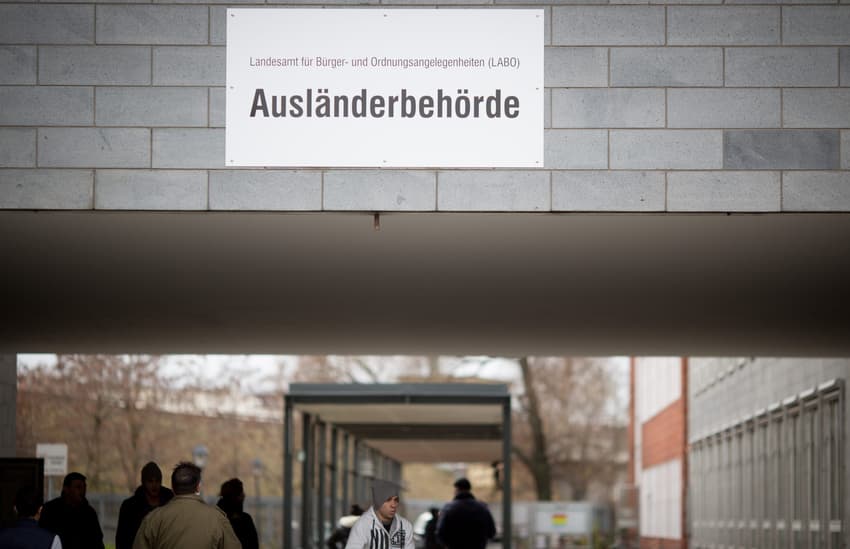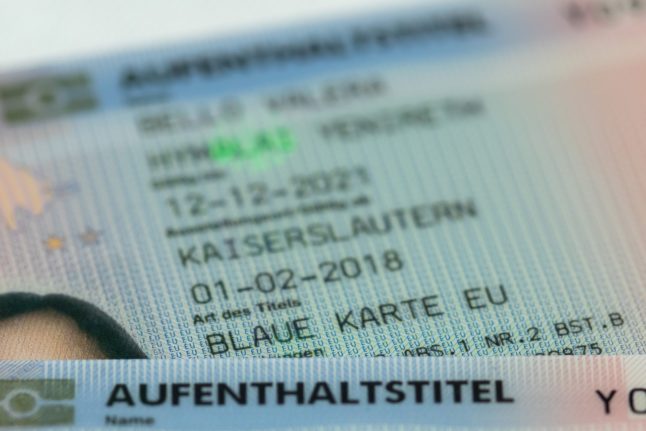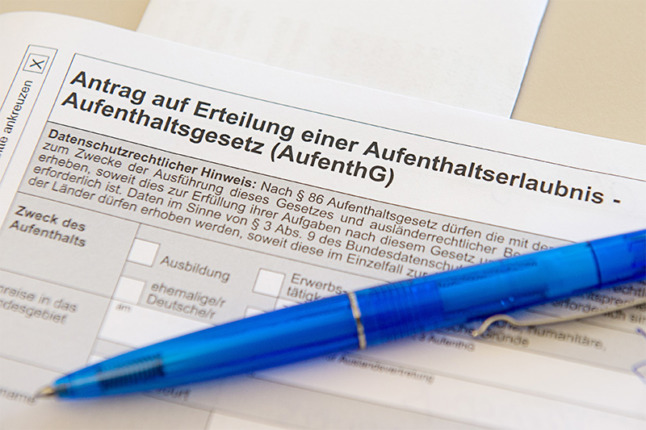TIMELINE: When will Germany's new immigration rules come into force?

Germany's hotly anticipated skilled worker immigration law was passed in the Bundesrat this Friday. So when will foreigners be able to take advantage of some of its benefits, from the new points-based Opportunity Card to simpler family reunification?
In spite of bad tempered protest from the opposition benches, Germany's new Skilled Worker Immigration Act is coming - and for thousands of foreigners hoping to find a route to migrate to the country, it couldn't come a moment too soon.
As a new study revealed this month, skilled workers from non-EU countries currently face massive hurdles when attempting to move to Germany, from confusing visa regulations to lengthy waiting times.
But with a range of new measures designed to make moving to Germany simpler and more appealing for people with qualifications, the government is hoping it can turn the country into the next big immigration destination and plug its ever-widening skills gap.
These include introducing a special points-based permit for jobseekers that would allow them to enter the country for up to 12 months in order to look for work, lowering the salary threshold for Blue Card applicants, easing family reunification rules and making life easier for international students.
Hailed as the "most modern migration law in the world" by Interior Minister Nancy Faeser (SPD), the changes are likely to have a significant impact on people migrating to Germany - and the majority of the new rules should be in place within the next twelve months.
What's happened so far?
After making a number of last-minute changes to the Skilled Workers Immigration Act - including easing language requirements for the points-based permit - the bill was passed in the Bundestag on June 23rd.
Despite fierce opposition from the CDU, who described the bill as "false advertising", and the far-right AfD, the bill was passed easily with support from all three governing parties: the SPD, Greens and FDP.
On July 7th - the last day before the summer recess - the bill was passed in the Bundesrat, Germany's upper house of parliament. This paves the way for it to be signed into law.
READ ALSO: German Bundestag passes sweeping immigration reforms bill
What happens next?
Following successful votes in the Bundestag and Bundesrat, the legislation has just a few more bureaucratic hurdles to clear before it becomes a reality.
It will first be printed in full and signed by the chancellor and responsible minister - in this case, Nancy Faeser - and then to President Walter Steinmeier to check whether it has been passed in accordance with Germany's constitution.
After Steinmeier signs off on the bill, it officially enters into law.
September/October: Final sign-off
Since parliament is currently in summer recess, the final few stages involved in signing the bill into law are likely to be pushed back until after the break.
That means that we could see Steinmeier put his signature on the Skilled Worker Immigration Act sometime in September, which would set the ball rolling on the mammoth task of implementing it.
November: EU Blue Card regulations
Speaking to The Local, a spokesperson for the Interior Ministry explained that most of the changes set out in the Skilled Worker Immigration Act would be scheduled to come into force six months after it officially enters into law. This is to give stakeholders such as the Foreigners' Offices time to implement the new systems and rules.
However, one part of the bill arrive much sooner: the new guidelines and requirements for EU Blue Card holders. According to the spokesperson, the EU's Blue Card Directive "stipulates that member states must have transposed the Directive by November 18th 2023 at the latest", which means that these changes must have come into force by this deadline.

Two Blue Cards for foreign skilled workers are on a table at the Federal Office for Migration and Refugees in Bavaria. Photo: picture alliance/dpa | Daniel Karmann
That will mean that people applying for an EU Blue Card after this date can take advantage of the relaxed rules, including a drastic reduction in the salary threshold to €3,500 gross per month and special carve-outs for IT workers without a degree.
Beyond this, the Interior Ministry spokesperson confirmed that a few other changes could happen in November as well. "Other regulations that are to be implemented quickly are also to enter into force as early as this date," they explained.
READ ALSO: 8 things to know about Germany's new skilled worker immigration law
March: Majority of changes come into force
As mentioned, the general implementation phase of a new bill lasts for six months after it is signed into law by the president. That means that, by March next year, the bulk of the transformation to Germany's immigration system should be complete.
This includes plans to widen family reunification to include the parents and parents-in-law of migrants, rather than just spouses and children under the age of 18, and to scrap "sufficient living space" requirements for family reunification. According to the Interior Ministry, this would come into force on March 1st, 2023.
It also includes plans to loosen the requirements for foreigners to have professional qualifications in a specific field before moving to Germany. Instead, non-EU foreigners will be able to move to the country with two years of professional and two years of educational experience.
Switching visas will also be made much simpler for people who are already in Germany, and new routes will be available for refugees to switch to a working visa.
READ ALSO: How foreigners will be able to bring their families to Germany under new skilled worker law
June: Opportunity Card and West Balkans Regulation
The headline change in the Skilled Worker Immigration Law is likely to take the longest to implement, with the Interior Ministry giving itself a full nine months after the law comes into force to sketch out its Opportunity Card system.

An application for a residence permit. Photo: Wolfram Kastl/dpa
This is the name that's been given to the points-based jobseekers' visa that foreigners will be able to apply for under the new law.
In addition, the amendments to the West Balkans Regulation, which are designed to attract more workers from countries like Albania, Kosova and Bosnia, will also be scheduled to come into force at this point.
READ ALSO: How Germany plans to attract more workers from the Balkans
Why does Germany need a skilled worker law?
Despite its status as an economic powerhouse in Europe, Germany has been struggling to attract enough skilled workers into the country to fill its shortages.
Though there are likely to be numerous reasons for this - including a preference for anglophone countries like the US, UK and Canada - one key issue is the number of bureaucratic hurdles foreigners face in moving to the country.
This was highlighted by a recent study that uncovered the struggle of thousands of skilled workers who were interested in moving to Germany from a non-EU country.
Of the 30,000 qualified workers from abroad questioned by the Organisation for Economic Co-operation and Development (OECD) last year, just four percent managed to make it to Germany within six months, despite the fact that half had firm plans to move and 80 percent had already taken the first steps.
READ ALSO:
- Language and long waits: Why skilled workers are put off moving to Germany
- Could backlogs at Germany's foreigners' offices stifle skilled immigration?
Of the people who did manage to migrate in this time, ten percent said they had waited over six months for their application to be processed. And despite the fact that half of the workers were employed in an industry currently hit by a skilled worker shortage, a significant number said they were struggling to conduct a job search from abroad.
The government is hoping that making the rules more flexible, speeding up the process and offering a chance for workers to come to Germany before finding a job will help solve some of these ongoing problems.
Comments
See Also
In spite of bad tempered protest from the opposition benches, Germany's new Skilled Worker Immigration Act is coming - and for thousands of foreigners hoping to find a route to migrate to the country, it couldn't come a moment too soon.
As a new study revealed this month, skilled workers from non-EU countries currently face massive hurdles when attempting to move to Germany, from confusing visa regulations to lengthy waiting times.
But with a range of new measures designed to make moving to Germany simpler and more appealing for people with qualifications, the government is hoping it can turn the country into the next big immigration destination and plug its ever-widening skills gap.
These include introducing a special points-based permit for jobseekers that would allow them to enter the country for up to 12 months in order to look for work, lowering the salary threshold for Blue Card applicants, easing family reunification rules and making life easier for international students.
Hailed as the "most modern migration law in the world" by Interior Minister Nancy Faeser (SPD), the changes are likely to have a significant impact on people migrating to Germany - and the majority of the new rules should be in place within the next twelve months.
What's happened so far?
After making a number of last-minute changes to the Skilled Workers Immigration Act - including easing language requirements for the points-based permit - the bill was passed in the Bundestag on June 23rd.
Despite fierce opposition from the CDU, who described the bill as "false advertising", and the far-right AfD, the bill was passed easily with support from all three governing parties: the SPD, Greens and FDP.
On July 7th - the last day before the summer recess - the bill was passed in the Bundesrat, Germany's upper house of parliament. This paves the way for it to be signed into law.
READ ALSO: German Bundestag passes sweeping immigration reforms bill
What happens next?
Following successful votes in the Bundestag and Bundesrat, the legislation has just a few more bureaucratic hurdles to clear before it becomes a reality.
It will first be printed in full and signed by the chancellor and responsible minister - in this case, Nancy Faeser - and then to President Walter Steinmeier to check whether it has been passed in accordance with Germany's constitution.
After Steinmeier signs off on the bill, it officially enters into law.
September/October: Final sign-off
Since parliament is currently in summer recess, the final few stages involved in signing the bill into law are likely to be pushed back until after the break.
That means that we could see Steinmeier put his signature on the Skilled Worker Immigration Act sometime in September, which would set the ball rolling on the mammoth task of implementing it.
November: EU Blue Card regulations
Speaking to The Local, a spokesperson for the Interior Ministry explained that most of the changes set out in the Skilled Worker Immigration Act would be scheduled to come into force six months after it officially enters into law. This is to give stakeholders such as the Foreigners' Offices time to implement the new systems and rules.
However, one part of the bill arrive much sooner: the new guidelines and requirements for EU Blue Card holders. According to the spokesperson, the EU's Blue Card Directive "stipulates that member states must have transposed the Directive by November 18th 2023 at the latest", which means that these changes must have come into force by this deadline.

That will mean that people applying for an EU Blue Card after this date can take advantage of the relaxed rules, including a drastic reduction in the salary threshold to €3,500 gross per month and special carve-outs for IT workers without a degree.
Beyond this, the Interior Ministry spokesperson confirmed that a few other changes could happen in November as well. "Other regulations that are to be implemented quickly are also to enter into force as early as this date," they explained.
READ ALSO: 8 things to know about Germany's new skilled worker immigration law
March: Majority of changes come into force
As mentioned, the general implementation phase of a new bill lasts for six months after it is signed into law by the president. That means that, by March next year, the bulk of the transformation to Germany's immigration system should be complete.
This includes plans to widen family reunification to include the parents and parents-in-law of migrants, rather than just spouses and children under the age of 18, and to scrap "sufficient living space" requirements for family reunification. According to the Interior Ministry, this would come into force on March 1st, 2023.
It also includes plans to loosen the requirements for foreigners to have professional qualifications in a specific field before moving to Germany. Instead, non-EU foreigners will be able to move to the country with two years of professional and two years of educational experience.
Switching visas will also be made much simpler for people who are already in Germany, and new routes will be available for refugees to switch to a working visa.
READ ALSO: How foreigners will be able to bring their families to Germany under new skilled worker law
June: Opportunity Card and West Balkans Regulation
The headline change in the Skilled Worker Immigration Law is likely to take the longest to implement, with the Interior Ministry giving itself a full nine months after the law comes into force to sketch out its Opportunity Card system.

This is the name that's been given to the points-based jobseekers' visa that foreigners will be able to apply for under the new law.
In addition, the amendments to the West Balkans Regulation, which are designed to attract more workers from countries like Albania, Kosova and Bosnia, will also be scheduled to come into force at this point.
READ ALSO: How Germany plans to attract more workers from the Balkans
Why does Germany need a skilled worker law?
Despite its status as an economic powerhouse in Europe, Germany has been struggling to attract enough skilled workers into the country to fill its shortages.
Though there are likely to be numerous reasons for this - including a preference for anglophone countries like the US, UK and Canada - one key issue is the number of bureaucratic hurdles foreigners face in moving to the country.
This was highlighted by a recent study that uncovered the struggle of thousands of skilled workers who were interested in moving to Germany from a non-EU country.
Of the 30,000 qualified workers from abroad questioned by the Organisation for Economic Co-operation and Development (OECD) last year, just four percent managed to make it to Germany within six months, despite the fact that half had firm plans to move and 80 percent had already taken the first steps.
READ ALSO:
- Language and long waits: Why skilled workers are put off moving to Germany
- Could backlogs at Germany's foreigners' offices stifle skilled immigration?
Of the people who did manage to migrate in this time, ten percent said they had waited over six months for their application to be processed. And despite the fact that half of the workers were employed in an industry currently hit by a skilled worker shortage, a significant number said they were struggling to conduct a job search from abroad.
The government is hoping that making the rules more flexible, speeding up the process and offering a chance for workers to come to Germany before finding a job will help solve some of these ongoing problems.
Join the conversation in our comments section below. Share your own views and experience and if you have a question or suggestion for our journalists then email us at [email protected].
Please keep comments civil, constructive and on topic – and make sure to read our terms of use before getting involved.
Please log in here to leave a comment.